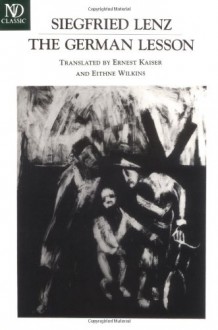In writing this novel, one of the major works of German fiction to appear since the Second World War, Siegfried Lenz has written, 'I was trying to find out where the joys of duty could lead a people.' His exploration is a disturbing triumph. Siggi Jepsen, the protagonist, is embroiled in the...
show more
In writing this novel, one of the major works of German fiction to appear since the Second World War, Siegfried Lenz has written, 'I was trying to find out where the joys of duty could lead a people.' His exploration is a disturbing triumph. Siggi Jepsen, the protagonist, is embroiled in the conflict between the totalitarian Nazi government and a creative artist. As a young boy he watched his father, constable of the northernmost police station in Germany, doggedly carry out orders from Berlin to stop a well-known Expressionist, their neighbour, from painting and to seize all his 'degenerate' work. Soon Siggi is hiding the paintings to keep them safe from his father. Against the great brooding landscape of the Danish borderland, Siggi recounts the clash of father and son, of duty and personal loyalty in wartime Germany. '"The German Lesson" has the virtue of being a novel about the War and about persecution which deliberately avoids violence and obvious horrors. To this ...are added the ...merits of lucidity, elegance, a brilliant organizing skill' - "The Sunday Times". 'Visually the wary folk and bitter landscape of the Danish borderland comes over as potently as Grass' East Prussia' - "The Guardian". 'The timeless conflict ...'duty' versus individual conscience and morality is given bizarre, complex form in Lenz's powerful tale...Mordantly witty, despairing, impassioned, this is one of the most deeply imagined and thought-provoking novels from Germany in years' - "Library Journal". '"The German Lesson" marks a double triumph - a book of rare depth and brilliance, to begin with, presented in an English version that succeeds against improbable odds in conveying the full power of the original' - Ernst Pawel, "The New York Times Book Review". '"The German Lesson" is, quite simply, the book I have been waiting ever since the end of World War 11 for a German to write' - Kaye Boyle. 'A remarkable, earnest and important novel. Lenz moves toward realizing new dimensions and perspectives on the German sensibility that must contribute to our eventual understanding of the madness of the times' - Robert K. Morris, "The Nation". 'If ever the Third Reich was pictured in microcosm, with its prejudices against people not rooted in the land, and its tiny spasms of nationalistic fervour that added up to an irrational howl in final sum, then Lenz has done it ...has surpassed it' - Christopher Lehmann-Haupt, "New York Times".
show less

